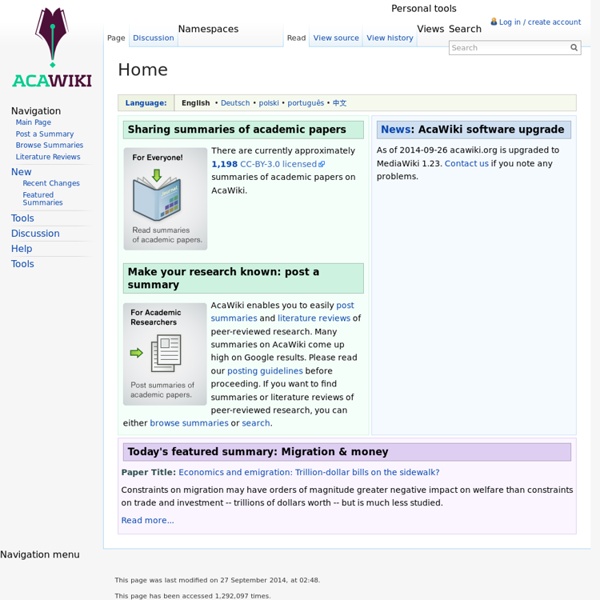



SOL: Semana de Obras Libres | Vote & Vax: Promoting Election Day Flu Clinics Videoneat Watch Free Documentaries and Lectures Online ad free Definition - Definition of Free Cultural Works ChildCount.org | Every Child Counts LibriVox untitled ¡Copiad, malditos! derechos de autor en la era digital - elegant mob films Clinic Center for Innovation: 2010 Transform Symposium - Speaker Bios Esther Dyson is actively involved in improving the world's health, both as an investor and a research subject. Her genome and some health records are available online to the public, courtesy of George Church's Personal Genome Project. She believes fiercely in the power of information to affect people's behavior and to improve the quality of health as well as health care. She has written two monographs on electronic records and health information liquidity, and ran the 2005 Personal Health Information workshop cosponsored by New York's New School University. Dyson brings to her work insights from economics, information technology, management practice and practical psychology. However, her primary activity is investing in startups and guiding many of them as a board member. Dyson is also active in the nonprofit world. See Esther's talk
Libre Accès : " Ni SACEM, Ni Jamendo ! " À l'heure où certaines menaces planent sur la neutralité d'internet, des modèles économiques de rémunération de la création commencent à s'affronter. Récemment, l'entreprise luxembourgeoise Jamendo a lancé un pavé dans la mare en annonçant son projet de sonoriser des lieux commerciaux avec de la musique provenant de sa plateforme. Ce projet entre directement en conflit avec la SACEM, qui jusqu'ici, en France était la seule interlocutrice de ces lieux. Nous assistons à une nouvelle forme de libéralisation de la culture, où une plateforme de musique en vient à commercialiser des œuvres en libre diffusion, en se posant comme concurrente d'une société de gestion de droits d'auteurs. Cette attaque d'une société commerciale démontre certainement le grand désarroi d'auteurs qui ne font plus confiance à une société de gestion censée les représenter. Il est dommageable que la politique de certaines Sociétés de Gestion en Europe ne semble pas plus morale que le business d'une startup internet.
Core77 / industrial design magazine + resource / home